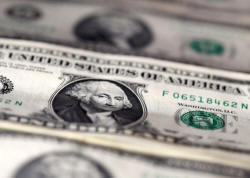|
Election risks, retail
sales hurt pound and euro
 Send a link to a friend
Send a link to a friend
 [February 17, 2017]
By Patrick Graham [February 17, 2017]
By Patrick Graham
LONDON
(Reuters) - Falls for the euro and the pound dominated trade in the
major global currencies on Friday, hit by a combination of nerves over
upcoming French elections and signs British consumers are beginning to
struggle in the face of the Brexit effect.
A week of trading dominated by fairly tight ranges and discussion of the
outlook for U.S. inflation and interest rates looked set to end with the
sixth loss in eight weeks for the dollar, quelling hopes of a new rally
in the greenback.
But it was a report that suggested the French left could unite behind
one candidate in presidential elections, possibly knocking centrist and
right-leaning nominees out of the race in the first round, that grabbed
the attention in the European morning.
The yen -- investors' favored safe haven for capital in times of global
and political uncertainty -- rose 0.4 percent against the dollar <JPY=>
and 0.6 percent against the euro <EURJPY=> on the day.
The euro dipped around a quarter of a percent to $1.0648.

"It seems like a broader, but fairly small, risk-off move," said Josh
O'Byrne.
"We saw the odds for a Le Pen victory move a bit higher this morning.
That seemed to drive a bit of weakness in (bond prices in the euro zone)
periphery as well."
Sterling meanwhile hit a 10-day low against the euro after a surprise
third monthly fall running in British retail sales pointed to weakening
consumer sentiment as the government gets ready to launch talks on
leaving the European Union.
Shoppers have driven a relatively robust performance for Britain's
economy since last June's Brexit vote but sales volumes fell 0.3 percent
month-on-month in January - much weaker than forecasts for a 0.9 percent
increase.
Those were just the latest signs of fatigue among households facing the
impact of a 20 percent fall in the value of sterling and rising fuel
prices.
[to top of second column] |

U.S. dollar notes are seen in this November 7, 2016 picture
illustration. REUTERS/Dado Ruvic/Illustration

"Retail was the beating heart of the UK economy in 2016, so with
consumer spending expected to slide in the coming months we could see
the pound push lower against both the euro and the dollar," said Paul
Sirani, Chief Market Analyst at broker Xtrade.
U.S. government bond yields, rising steadily over the past 10 days, hit
a wall on Wednesday and barring a broader revival in U.S. time, the
dollar index was on course for another small weekly fall.
Many banks still expect the greenback to make more progress in the
months ahead, but the signals on policy emerging from Washington have
not engendered further confidence in U.S. President Donald Trump's
promise to reflate the U.S. economy.
A combative presidential news conference on Thursday followed the
resignation of National Security Adviser Michael Flynn this week and had
analysts again wondering how effective the administration will be in
pushing through its legislative agenda.
"Despite the relatively strong data we have seen, the dollar is not
doing better and I think that is that moderation of expectations on
Trump," Citi's O'Byrne said.

"Yesterday’s news conference perhaps was also an additional factor
moderating that Trump theme."
(Additional reporting by Shinichi Saoshiro in TOKYO; editing by John
Stonestreet)
[© 2017 Thomson Reuters. All rights
reserved.] Copyright 2017 Reuters. All rights reserved. This material may not be published,
broadcast, rewritten or redistributed. |